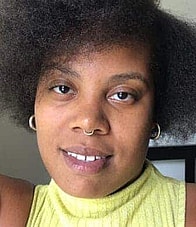When Black millennial mother of two and Howard University professor Dr. Brandale Cox considers her peers (fellow millennial mothers), she said, “I see a lot of hope. But a lot of issues that need to be addressed.” Particularly as it pertains to Black millennial mothers’ mental health and work-life balance.
Dr. Cox recently released “The Millennial Motherhood Experience” study, which explores the experiences of Black millennial mothers and reveals key findings related to mental health, the role of online communities, cultural integration, parenting styles, and the dynamics of raising children today. Dr. Cox sat down with theGrio to discuss her findings and how she gained a comprehensive understanding of her peers in motherhood.

The professor said she surveyed over 500 millennial mothers, ages 26 to 41, from around the country. Overwhelmingly, she found millennial mothers have more in common with one another than not, regardless of race and socioeconomic status. However, she said Black millennial mothers, who represented 18% of the respondents, led in certain categories.
“The key takeaway is that a lot of us are experiencing the same thing. But there are some cultural nuances and things that are culturally significant to the Black experience [and] the Black motherhood experience,” said Dr. Cox.
Some of those nuances, she said, involve incorporating the mother’s culture into parenting, working with parenting traditions inherited from other generations, and mental health, an area where Black women consistently showed higher rates of struggle. She noted that there’s an additional layer of stress for Black mothers.
“As Black people existing in American society, we already have this burden of Blackness that we carry with us every day,” said Dr. Cox. “And we are bringing that burden — assuming, as the research may indicate — into parenting children and equipping them for this world.”
The professor added that, as a result, Black mothers face the unique challenge of finding ways to effectively parent Black children without exhausting themselves. “I think that probably has a lot to do with that mental illness uptick for Black women in this survey,” she said.
Regarding work-life balance, Dr. Cox found 45% of Black mothers self-identified as stay-at-home moms compared to 54% of white mothers.
“That is a huge enough disparity to make you think about the ‘why’ behind that,” she said.
Dr. Cox said one could make many assumptions about why, but her research is consistent with prior reports. Statistically, more than 80% of Black mothers are the sole household breadwinner, compared to 50% of white women.
“So we see that reflected in a way in this data,” she said.
She added that her data further emphasized the need for Black women’s pay equity and increased access to other resources and community support.
“It really exemplifies the importance of equitable pay in terms of providing women resources at work to take the lead, to be able to be more present with their children,” she said. “But also in providing them that space online to connect with other individuals and share their experiences.”
Whether it be a relatable motherhood meme account on Instagram, a well-informed mommy blogger, or even a hyper-specific Facebook mommy group, Dr. Cox found millennial mothers are seeking and finding support online, especially Black mothers. Dr. Cox, who said she follows a few mom-centric Facebook groups, found 56% of Black women turned to online resources compared to 41% of white women.
When asked what inspired the report, Dr. Cox explained, “I was really interested in learning about what is directly impacting millennial mothers because I am a millennial. … And specifically Black millennial mothers because, in my circles, we share these things anecdotally.” She continued, “But I was interested in seeing if what me and my friends were experiencing were the same experiences across the nation for Black women and other millennial mothers.”
Dr. Cox said she also hopes this study can inspire change in some crucial areas, including mental health, pay equity, societal pressure, and systemic barriers.
As for her overall impression of millennial motherhood, Dr. Cox says, in a word, it’s complex.
“Millennial motherhood is a beautifully complex tapestry woven with the threads of ambition, adaptability, and deep emotional connection. It is a journey where digital natives navigate the intersection of technology, self-discovery, and the profound responsibility of nurturing the next generation,” Dr. Cox wrote in the study. “In the face of societal expectations and shifting dynamics, millennial mothers redefine motherhood, embracing their unique narratives and crafting a new narrative of strength, resilience, and unapologetic authenticity.”
To put it simply, she said, “There are some specific cultural nuances that shape how we mother and how we parent, but I think we’re all just trying to do the best that we can to make great humans.”

Kay Wicker is a lifestyle writer for theGrio covering health, wellness, travel, beauty, fashion, and the myriad ways Black people live and enjoy their lives. She has previously created content for magazines, newspapers, and digital brands.
TheGrio is FREE on your TV via Apple TV, Amazon Fire, Roku, and Android TV. TheGrio’s Black Podcast Network is free too. Download theGrio mobile apps today! Listen to ‘Writing Black’ with Maiysha Kai.

